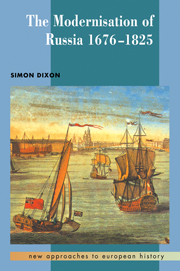8 - The economy
Published online by Cambridge University Press: 05 June 2012
Summary
Many textbooks begin with the economy. Here it has been left until last — not because it is unimportant, but because economics is best understood in the context of society, politics, and culture. It is fortunate that economic history is more than a matter of numbers since Russia's surviving statistical record is thin. So sparse are the sources in some sectors that one cannot ‘put the numbers in’ without making many of them up: the beginner is faced with a bewildering array of those mutually incompatible multipliers with which scholars lay snares for the unwary. Be it a question of population, production, or price series, the lack of standardised contemporary measures is not the least obstacle to a universally acceptable quantitative methodology. Yet it would be perverse not to acknowledge the advances that cliometricians have made. Their conclusions inform much of what follows.
One further difficulty is worth stressing at the start. The national state ranks amongst the least appropriate units for the purposes of economic analysis. Whilst long-term change is probably best assessed on a continental or even global scale, short-term regional variations deprive many national aggregates of meaning. If this be true of Britain, how much more so of the Russian empire, whose vast territory encompassed almost every climatic and ecological variable except the tropical swamp.
- Type
- Chapter
- Information
- The Modernisation of Russia, 1676–1825 , pp. 221 - 255Publisher: Cambridge University PressPrint publication year: 1999

